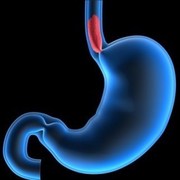Treatment
Treatment may include:
Surgery
A surgery may be done to remove the tumor. The doctor might remove all or part of your esophagus, as well. A plastic tube might be used to replace the missing portion of esophagus.
Radiation Therapy
The use of radiation to kill cancer cells and shrink tumors. Radiation may be:
- External radiation therapy—radiation directed at the esophagus from a source outside the body
- Internal radiation therapy – radioactive materials placed into the esophagus in or near the cancer cells
Chemotherapy
The use of drugs to kill cancer cells. Chemotherapy may be given in many forms. This can include by pill, injection, and via a catheter. The drugs enter the bloodstream. It travels through the body. It will kill mostly cancer cells. Some healthy cells may also be killed.
Chemotherapy alone will not cure this type of cancer. It is only used when the cancer has already spread and cannot be cured. At this point it is used to help shrink the tumor and help ease pain or control nausea.
Chemoradiotherapy or Combined Modality Therapy
Chemotherapy and radiation therapy together are better than radiotherapy alone. It has also been shown that these two treatments may be as effective as surgery alone.
Trimodality Therapy
Chemotherapy and radiation therapy are followed by a surgery. This has been shown to be a most aggressive form of therapy. It may be the best way to cure a patient of their disease.
Laser Therapy
High-intensity light used to try to kill cancer cells.
Photodynamic Therapy
A combination of drugs and special lights used to try to kill cancer cells.
This therapy is a promising treatment approach but is only appropriate in a very small number of patients. There are limits of how far the infrared light source will travel into the cancer itself. The tumor must be very small (smaller than ¼ inch thick). It must not involve any lymph nodes or other structures.
Please be aware that this information is provided to supplement the care provided by your physician. It is neither intended nor implied to be a substitute for professional medical advice. CALL YOUR HEALTHCARE PROVIDER IMMEDIATELY IF YOU THINK YOU MAY HAVE A MEDICAL EMERGENCY. Always seek the advice of your physician or other qualified health provider prior to starting any new treatment or with any questions you may have regarding a medical condition. Copyright © 2024 EBSCO Publishing All rights reserved.
 Esophageal Cancer Treatment Options
Esophageal Cancer Treatment Options



